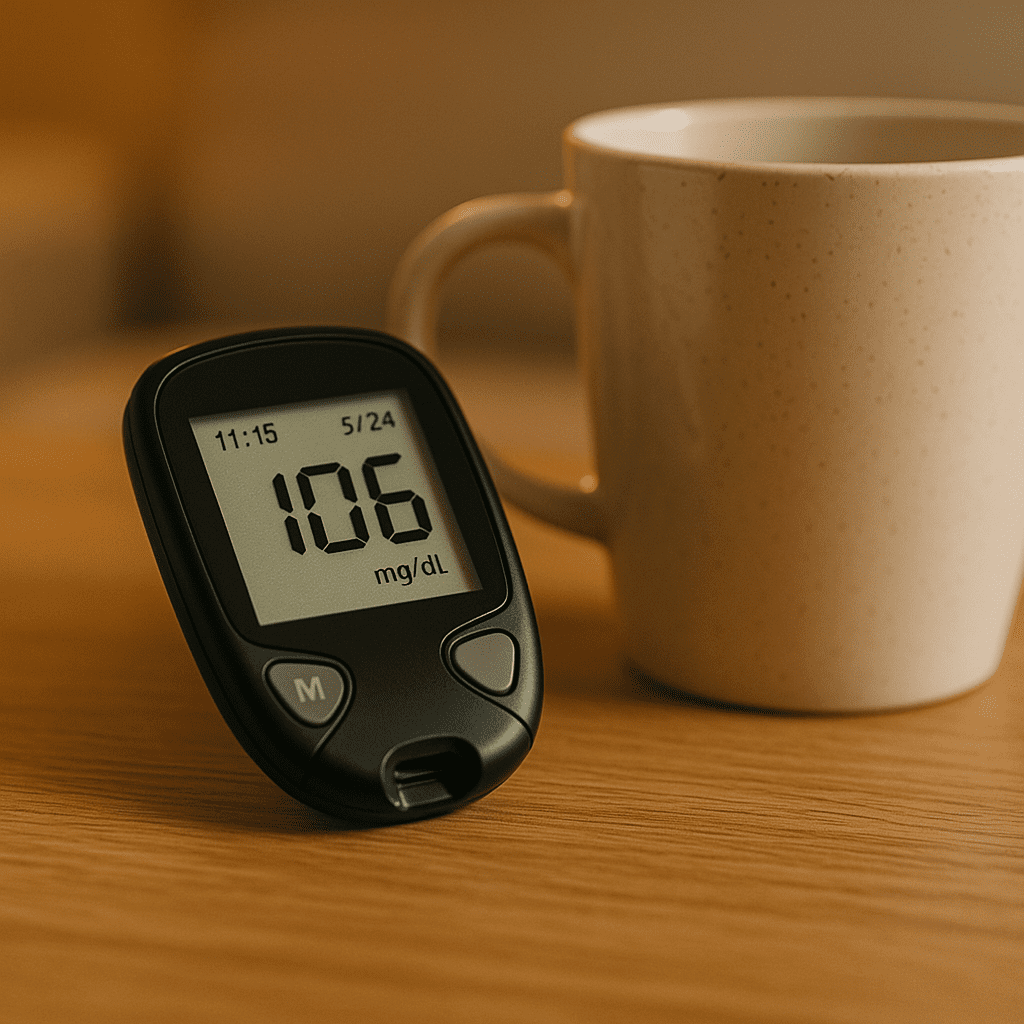Coffee is a daily ritual for millions across the globe, often consumed to kickstart the morning or provide a midday mental boost. Its primary active compound, caffeine, is well known for its stimulating effects on the central nervous system. But for individuals managing blood sugar fluctuations or those concerned about insulin sensitivity, a lingering question remains: can coffee affect blood sugar levels? More specifically, does caffeine raise blood sugar, and if so, how significantly? Understanding the complex relationship between coffee and glucose control has become a subject of growing interest among researchers and healthcare professionals alike.
You may also like: How Diabetes Affects the Brain: Understanding Brain Fog, Memory Loss, and Mental Confusion from High Blood Sugar
Emerging research highlights a nuanced interaction between caffeine consumption and glycemic control. While observational studies have linked regular coffee intake to a lower risk of developing type 2 diabetes, acute effects of caffeine—especially in the short term—can lead to impaired glucose metabolism in certain individuals. These seemingly contradictory outcomes warrant a deeper dive into the mechanisms behind caffeine’s effects, individual variability, and practical strategies for those navigating blood sugar concerns.
In this article, we’ll examine how coffee affects blood sugar levels by exploring the physiological mechanisms, research findings, and practical considerations for consumers. We will also address questions like how long after the morning sugar spike can you drink coffee, and whether different types of coffee (such as black coffee versus sweetened lattes) have varying impacts on glucose levels. By combining scientific evidence with real-world applications, we aim to provide clarity for readers seeking both accurate information and actionable insights.

The Biochemistry of Caffeine and Glucose Regulation
To understand whether coffee can raise blood sugar, we must first examine how caffeine interacts with the body’s glucose regulatory systems. Caffeine acts primarily as an adenosine receptor antagonist. By blocking adenosine, a neurotransmitter that promotes relaxation and drowsiness, caffeine increases alertness. However, this same mechanism indirectly stimulates the release of adrenaline (epinephrine), which can affect blood sugar metabolism.
Adrenaline is a counter-regulatory hormone, meaning it raises blood glucose levels by promoting glycogenolysis—the breakdown of glycogen into glucose in the liver. This process increases circulating glucose to provide immediate energy, particularly under stress or in preparation for physical activity. While this is a useful adaptive response, it can lead to a temporary rise in blood sugar, especially in individuals with insulin resistance or impaired glucose tolerance.
In addition to its effect on adrenaline, caffeine may interfere with insulin signaling. Some studies suggest that caffeine can reduce insulin sensitivity, at least in the short term. This means the body’s cells become less efficient at taking in glucose from the bloodstream, potentially resulting in elevated glucose levels after meals. However, the magnitude of this effect can vary significantly among individuals, influenced by factors such as genetic variability, habitual caffeine consumption, and baseline metabolic health.
It’s important to note that not all of caffeine’s effects are detrimental. Caffeine has been shown to increase thermogenesis and lipolysis (fat breakdown), which may benefit overall metabolism. Furthermore, coffee is rich in polyphenols and antioxidants, including chlorogenic acids, which have demonstrated positive effects on insulin sensitivity and glucose absorption. This complexity underscores why the answer to “does coffee raise blood sugar?” depends on context, dose, and individual biology.
Acute Versus Chronic Effects of Coffee on Blood Sugar
A crucial distinction must be made between the acute and chronic effects of coffee consumption on blood sugar levels. Many clinical studies examining coffee’s impact on glucose metabolism have noted that caffeine, when consumed acutely, can elevate blood sugar and reduce insulin sensitivity. This effect is particularly notable in individuals with type 2 diabetes or prediabetes.
For instance, a randomized controlled trial published in Diabetes Care found that a 250 mg dose of caffeine—equivalent to about two cups of coffee—consumed before a carbohydrate-rich meal significantly raised postprandial glucose levels in people with type 2 diabetes. These results suggest that caffeine can impair glucose tolerance in the short term, especially when consumed alongside high-carbohydrate foods.
In contrast, long-term observational studies have consistently shown that regular coffee consumption is associated with a reduced risk of developing type 2 diabetes. A meta-analysis published in the journal Archives of Internal Medicine found that individuals who consumed four or more cups of coffee daily had a significantly lower risk of type 2 diabetes compared to non-drinkers. These findings imply that habitual coffee consumption may induce adaptive responses that counteract the short-term effects of caffeine.
The key to reconciling these findings lies in adaptation and tolerance. Regular coffee drinkers often develop a degree of tolerance to caffeine’s physiological effects, including its impact on glucose metabolism. Over time, the body adjusts, and the acute rise in blood sugar may become less pronounced. Additionally, the beneficial compounds in coffee—particularly chlorogenic acids—may exert protective effects that outweigh the transient impact of caffeine.
The Role of Individual Variability in Caffeine Response
The question of whether coffee can raise your blood sugar levels must be considered in light of individual variability. Genetic differences in caffeine metabolism, insulin sensitivity, and glucose regulation all contribute to how one’s body responds to coffee. For example, the CYP1A2 gene influences how quickly caffeine is metabolized. Individuals with the fast-metabolizing variant tend to process caffeine more efficiently and may experience fewer adverse metabolic effects than those with the slow-metabolizing version.
Moreover, habitual caffeine intake alters the body’s response over time. Someone who drinks coffee daily is likely to experience different effects than someone who rarely consumes it. Infrequent caffeine consumers may be more sensitive to its blood sugar–raising potential, particularly if they are already predisposed to insulin resistance.
Lifestyle factors also matter. The timing of coffee consumption relative to meals, physical activity, and stress levels can influence whether caffeine raises or stabilizes glucose levels. For instance, drinking coffee on an empty stomach first thing in the morning may contribute to a more pronounced blood sugar spike, especially if it precedes a high-carbohydrate breakfast. In such cases, the question arises: how long after a morning sugar spike can you drink coffee without exacerbating blood glucose fluctuations?
Although definitive answers are still under investigation, waiting 60 to 90 minutes after eating may allow blood sugar levels to stabilize before caffeine is introduced. Alternatively, pairing coffee with a protein-rich or fiber-rich meal may help mitigate its glycemic impact. These strategies can help individuals tailor their coffee habits based on their unique metabolic profile.
How Different Types of Coffee Affect Blood Glucose
When exploring whether coffee and blood sugar are linked, it’s important to distinguish between different types of coffee beverages. The metabolic impact of a black coffee is vastly different from that of a sugary flavored latte. While caffeine may influence glucose control, added sugars, syrups, whipped cream, and milk-based ingredients can have a much more significant effect on blood glucose.
For instance, a standard black coffee contains negligible calories and no sugar, making it a low-glycemic beverage. However, adding just one tablespoon of sugar contributes approximately 12.5 grams of carbohydrates—enough to affect blood sugar, particularly in individuals with insulin resistance. When sweetened creamers or flavored syrups are added, the total sugar content can quickly exceed 30 grams, creating a noticeable spike in blood glucose.
Milk and plant-based alternatives can also influence how coffee affects blood sugar. Dairy milk contains lactose, a naturally occurring sugar, while some plant milks, such as oat milk, are often sweetened and have a high glycemic index. In contrast, unsweetened almond or coconut milk may have minimal impact. Choosing low-glycemic additives or drinking coffee black can help individuals enjoy coffee without compromising glucose control.
It’s also worth considering the brewing method. Cold brew coffee, for example, tends to be less acidic and may contain higher levels of certain compounds like chlorogenic acids, which could enhance its beneficial effects. Espresso-based drinks, by contrast, are more concentrated in caffeine and may elicit a stronger physiological response. Therefore, the answer to whether coffee will raise blood sugar depends not only on the coffee itself but also on how it’s prepared and what accompanies it.
Caffeine Tolerance, Timing, and Circadian Influences
One of the most overlooked aspects of caffeine and blood sugar interaction is the role of timing and circadian rhythms. The body’s natural cortisol levels peak in the early morning hours—typically between 6:00 a.m. and 10:00 a.m.—as part of the circadian rhythm. Consuming caffeine during this window may amplify its stimulating effects, including any impact on glucose metabolism.
Many experts suggest waiting at least an hour after waking before consuming coffee, not only to avoid overstimulating cortisol production but also to prevent exacerbating a morning glucose spike. This approach helps answer a commonly asked question: how long after a morning sugar spike can you drink coffee without causing a secondary elevation in blood glucose? While exact timing may vary, allowing blood sugar to stabilize before introducing caffeine can make a meaningful difference, particularly for individuals managing diabetes or prediabetes.
Caffeine tolerance also plays a critical role. As the body adapts to regular caffeine intake, its metabolic effects may diminish. This means that for habitual coffee drinkers, the relationship between coffee and blood sugar may be less pronounced than in those who consume caffeine sporadically. However, tolerance is not uniform across all systems; some individuals may develop partial resistance to caffeine’s stimulatory effects while remaining sensitive to its influence on insulin signaling.
Understanding your unique response through self-monitoring—such as using a continuous glucose monitor (CGM)—can provide valuable insights. For instance, if you notice a consistent glucose rise after drinking coffee, even when consumed with a balanced meal, it may indicate sensitivity to caffeine’s metabolic effects. Adjusting timing, dosage, or switching to a decaffeinated option may help maintain more stable glucose levels throughout the day.
What About Decaffeinated Coffee?
Decaffeinated coffee offers an interesting case study in the caffeine and blood sugar debate. By removing most of the caffeine content, decaf provides an opportunity to isolate the effects of other coffee compounds—particularly polyphenols—on glucose metabolism. Several studies suggest that decaf coffee may retain many of the metabolic benefits of regular coffee without the potential downsides of caffeine.
For instance, chlorogenic acids found in both regular and decaf coffee have been shown to slow glucose absorption in the intestine and improve insulin sensitivity. In some cases, decaf coffee may even exert a modest glucose-lowering effect, particularly when consumed alongside meals. This positions decaf as a viable alternative for those concerned about whether caffeine will raise blood sugar.
However, it’s important to verify the caffeine content in so-called decaffeinated beverages. While labeled as decaf, most still contain trace amounts of caffeine—typically between 2 and 5 mg per cup. Although this is significantly lower than the 80 to 100 mg found in regular coffee, it may still affect highly sensitive individuals. If your goal is to minimize caffeine’s influence on blood sugar, be sure to check the preparation method and verify caffeine content.
The Potential Role of Coffee in Diabetes Prevention
Despite the concerns surrounding acute glucose elevations, long-term studies have consistently associated regular coffee consumption with a lower risk of developing type 2 diabetes. This paradox has led researchers to investigate which elements of coffee contribute to its protective effects. The most likely candidates are its antioxidant and anti-inflammatory compounds.
Chlorogenic acids, quinides, trigonelline, and magnesium are all bioactive constituents of coffee that may support metabolic health. These compounds are believed to improve insulin sensitivity, reduce oxidative stress, and modulate gut microbiota—factors all linked to glucose regulation. Some researchers have proposed that coffee may enhance glucose uptake in skeletal muscle or suppress hepatic glucose production over time, leading to more favorable glycemic outcomes.
Another factor is coffee’s association with healthier lifestyle behaviors. While not a causal relationship, individuals who consume coffee regularly may also engage in other health-promoting activities, such as physical activity, mindful eating, or maintaining social routines around their coffee rituals. These associated behaviors may partially explain the observed protective link between coffee and blood glucose control.
Nonetheless, more randomized trials are needed to confirm these benefits and establish clear guidelines. For now, the evidence suggests that moderate coffee consumption—up to three to four cups per day—is unlikely to harm glucose control and may even confer some protective effects in the long run.
Optimizing Coffee Habits for Better Blood Sugar Control
For individuals concerned about how coffee and blood glucose levels interact, there are several strategies to minimize adverse effects while still enjoying this beloved beverage. First, be mindful of timing. Waiting until after your first meal or ensuring your blood sugar has stabilized in the morning can reduce the likelihood of caffeine-induced glucose spikes.
Second, choose your coffee wisely. Opt for black coffee or versions with minimal sugar and low-glycemic additives. Avoid high-calorie, sugar-laden beverages that can significantly raise blood glucose. If you enjoy creaminess in your coffee, consider using unsweetened nut-based milks or low-carb creamers. These changes alone can significantly reduce the glycemic impact of your daily coffee.
Third, monitor your individual response. Using tools like glucometers or CGMs can provide personalized insights into how your body reacts to different types and timings of coffee. With this data, you can fine-tune your habits to optimize both enjoyment and health outcomes. If needed, consider transitioning to decaffeinated options, especially if you notice persistent blood sugar fluctuations linked to your coffee intake.
Finally, consider your overall dietary and lifestyle context. Coffee is just one variable in a complex metabolic equation. Ensuring adequate sleep, regular exercise, stress management, and a balanced diet will all play a role in determining whether coffee affects your blood sugar in meaningful ways.

Frequently Asked Questions: Coffee, Caffeine, and Blood Sugar
1. How long after a morning sugar spike can you drink coffee without affecting your glucose levels?
Understanding how long after a morning sugar spike can you drink coffee requires attention to individual glucose response curves. For most people, waiting 60–90 minutes after eating allows insulin levels to stabilize, minimizing the impact coffee may have on blood sugar levels. However, people with impaired insulin sensitivity might benefit from extending this window to 2 hours, especially if they notice that coffee and blood glucose levels fluctuate drastically after consumption. Pairing coffee with a fat or protein source may help blunt any glycemic volatility. Monitoring your blood sugar level after taking coffee at various time intervals can help identify your personal threshold.
2. Does caffeine raise blood sugar even if you’re fasting or haven’t eaten?
Yes, for some individuals, caffeine can raise blood sugar during fasting due to its effect on cortisol and adrenaline—hormones that promote glucose release. While caffeine and blood sugar responses vary widely, fasted individuals may see a slight increase in glucose even without any caloric intake. This is especially true for those with prediabetes or insulin resistance, where caffeine may temporarily impair glucose metabolism. So, while black coffee is often considered safe in a fasted state, the question “does caffeine raise blood sugar” must be personalized. Regular monitoring with a continuous glucose monitor can provide clearer answers.
3. Can coffee raise blood sugar if it’s decaffeinated?
Decaffeinated coffee has a reduced impact, but it can still affect blood sugar due to compounds like chlorogenic acid, which influence glucose metabolism. Even though the caffeine content is minimal, the interaction between coffee and glucose levels can still be significant in sensitive individuals. In fact, the answer to “can coffee raise your blood sugar levels” isn’t limited to caffeine—other polyphenols and acids in coffee also play a role. The brewing method, roast level, and whether it’s consumed with additives like milk or sugar can further modify its glycemic impact. Even decaf should be tested individually for tolerance.
4. Will coffee raise blood sugar differently in type 1 vs. type 2 diabetes?
Yes, the mechanisms differ significantly. In type 1 diabetes, the absence of endogenous insulin means any elevation caused by coffee and blood sugar interaction requires manual insulin correction. In contrast, in type 2 diabetes, caffeine may impair insulin sensitivity, making it harder for cells to absorb glucose, thus answering “does caffeine elevate blood sugar” more affirmatively. People with type 2 may also experience prolonged hyperglycemia after coffee due to slower insulin response. Since the endocrine context is different, blood sugar level after taking coffee must be evaluated within the diabetes type-specific metabolic environment.
5. Can caffeine raise blood sugar consistently, or does the effect diminish over time?
In some habitual drinkers, the body adapts to caffeine, and its glycemic impact may reduce due to tolerance. However, not everyone develops this metabolic desensitization. For others, caffeine and blood sugar fluctuations remain consistent regardless of long-term use, especially if underlying insulin resistance is present. So while the phrase “does caffeine raise blood sugar levels” may initially yield a yes, the answer could change depending on your usage history and metabolic flexibility. Consistency in coffee timing, portion size, and pairing with meals can make a notable difference in outcomes.
6. Does drinking coffee raise your blood sugar more in the morning than in the afternoon?
Morning coffee may have a greater glycemic effect due to the dawn phenomenon—a natural early-day rise in cortisol and blood glucose. If you’re wondering “does coffee raise blood glucose more at certain times,” the answer often lies in the body’s circadian hormone rhythms. Afternoon consumption may result in less pronounced glucose spikes, especially if cortisol has tapered. However, if you’re already dealing with a morning sugar spike, you might wonder how long after morning sugar spike can you drink coffee safely—waiting at least 1.5 hours may mitigate compounding effects. Blood sugar monitoring at different times can reveal your personal pattern.
7. Can coffee affect blood sugar levels when consumed with high-carb meals?
Absolutely. Coffee and blood sugar levels tend to spike more significantly when coffee is consumed alongside high-glycemic foods. The combination can create a dual-stressor effect, increasing both insulin demand and glucose output. If you’re asking “can coffee affect blood sugar” more severely under these conditions—the answer is yes, particularly for individuals with poor glucose control. To manage this, pair your coffee with protein or fiber-rich foods instead. Observing how your blood sugar level after taking coffee plus a high-carb breakfast behaves can help fine-tune your dietary strategy.
8. Does coffee increase blood sugar levels more with added cream and sugar?
Yes, the additives play a major role. While people often ask “can black coffee raise blood sugar,” the answer is more nuanced when cream and sugar are added. These extras significantly contribute to postprandial glucose spikes. Even non-dairy creamers often contain hidden sugars and hydrogenated oils, complicating how coffee and glucose levels interact. To better answer “does drinking coffee raise your blood sugar,” consider the total carbohydrate load in your cup—not just the coffee itself. Tracking macros and glycemic responses is essential for accurate insights.
9. Will caffeine affect blood sugar differently depending on your stress levels?
Yes, psychological and physiological stress can amplify caffeine’s glycemic effects. Under stress, cortisol and adrenaline levels rise, which in turn enhances caffeine’s impact on blood sugar. So, when considering “can caffeine raise blood sugar,” context matters—especially during high-stress periods. Coffee and blood glucose spikes are often more pronounced during exams, work pressure, or after poor sleep. This interplay underscores the importance of lifestyle factors in managing blood sugar. Practicing mindfulness or consuming coffee post-meal during calmer times can blunt this effect.
10. Can black coffee raise blood sugar during intermittent fasting or keto diets?
Surprisingly, yes. Even without sugar or cream, black coffee can trigger mild glucose elevations during fasting, especially in those with metabolic syndrome or adrenal fatigue. While often praised for its minimal caloric impact, people following keto diets may still ask “can coffee raise blood sugar” and “will coffee affect blood sugar” due to individualized glycemic responses. Black coffee may disrupt fasting benefits by increasing gluconeogenesis—a process where the liver releases stored glucose. This is particularly relevant if your goal is to stabilize glucose rather than simply avoid calories.

The Bottom Line: Can Coffee Affect Blood Sugar Levels? Yes—but Context Matters
So, can coffee affect blood sugar levels? The science suggests a nuanced answer. In the short term, especially in individuals sensitive to caffeine or those with impaired glucose tolerance, coffee may elevate blood glucose by promoting the release of adrenaline and temporarily reducing insulin sensitivity. However, in the long term, habitual coffee consumption appears to be associated with a reduced risk of type 2 diabetes, likely due to its rich profile of antioxidants and anti-inflammatory compounds.
The key to leveraging the benefits of coffee without compromising blood sugar lies in understanding your own metabolic response. Factors such as caffeine tolerance, genetic variability, timing of consumption, and beverage composition all play a role in determining the overall impact. Strategies like drinking coffee after meals, choosing unsweetened or low-glycemic options, and monitoring individual glucose responses can help mitigate risks.
Ultimately, whether coffee will raise blood sugar depends on both the drink and the drinker. With informed choices and personalized habits, it’s possible to enjoy coffee while supporting healthy glucose regulation. This balanced perspective allows for both scientific rigor and everyday practicality—offering a roadmap for anyone navigating the complex relationship between coffee, caffeine, and blood sugar control.
coffee and insulin resistance, caffeine metabolism, chlorogenic acid benefits, morning blood sugar regulation, glycemic impact of coffee, postprandial glucose response, coffee and type 2 diabetes risk, coffee additives and glucose, insulin sensitivity and caffeine, low-glycemic coffee options, black coffee metabolism, caffeine and hormonal response, circadian rhythms and coffee, cortisol and caffeine interaction, antioxidant properties of coffee, diabetes prevention strategies, caffeine tolerance effects, glucose monitoring tools, glycemic index of coffee drinks, metabolic effects of caffeine
Further Reading:
Caffeine: Does it affect blood sugar?
Effects of coffee consumption on glucose metabolism: A systematic review of clinical trials
Disclaimer: The content published on Better Nutrition News (https://betternutritionnews.com) is for informational and educational purposes only. It is not intended as a substitute for professional medical advice, diagnosis, or treatment. Always seek the guidance of a qualified healthcare professional before making any changes to your diet, nutrition, or wellness practices. The opinions expressed by authors and contributors are their own and do not necessarily reflect those of Better Nutrition News.
Better Nutrition News and its affiliates make no representations or warranties regarding the accuracy, completeness, or reliability of the information provided. We disclaim all liability for any loss, injury, or damage resulting from the use or reliance on the content published on this site. External links are provided for reference purposes only and do not imply endorsement.



